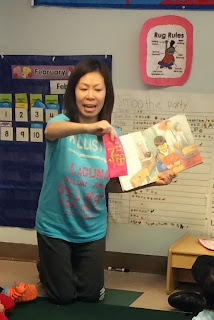One of the
hottest media topics is the increase in health risks for children, namely the
rising rates of childhood obesity. In fact, health experts have warned for the
first time in a long time that this generation of children may have a shorter
life expectancy than their parents. One way to combat childhood obesity is to
incorporate healthy activity and play into children’s lives.
Living in a climate where clouds and rain are common can be challenging, but according to the National Weather Service, with the proper clothing, children can play outdoors daily when weather and environmental conditions do not pose a significant health or safety risk:
- wind chill factor at or below minus 15°F
- heat index at or above 90°F
Governor Inslee, who has made improvements in children’s health a key Results Washington goal, worked with legislators in early 2014 to secure funding for his Healthiest Next Generation initiative. The public-private partnership developed strategies to reduce obesity in children such as promoting breastfeeding, supporting schools in providing more nutritious meal and drink options, and encouraging children to be more active.
The
Department of Early Learning supports the many benefits of activity.
Active play:
- Builds strong, fit bodies
- Supports a healthy weight
- Promotes balance and coordination
- Decreases chronic risk of disease
- Encourages active living habits
- Helps children sleep better
- Contributes to cognitive skills
- Improves behavior
- Promotes school readiness
- Teaches focus
- Enhances memory
Adrienne
Dorf, DEL’s Healthiest Next Generation Program Manager and Katy Levenhagen, Nutrition
Coordinator at Puget Sound Educational Service District trained to DEL childcare licensors this past spring on nutrition and
physical activity national evidenced based best practice standards. The two
outlined clear guidelines based on the best practice standards are as follows.
- Infants have at least 3, 5 minute sessions of supervised “tummy time” when they are awake
- Infant environment is least restrictive at all times
- Infants go outside 2-3 times a day
- Moderate to Vigorous Activity
- —Toddlers: 60 - 90 min for a full day
- —Preschoolers: 90 -120 min. for a full day
- School Age: At least 20 minutes for every 3 hours of care2 - 3 adult led activities/day
- Have children play outside 3 times or more per day
- Outdoor activity provides continuous opportunities to practice skills
- Never withhold active play as a form of punishment
Data from
the UW Center for Public Health Nutrition’s:
2013 Washington State Survey of Nutrition and Physical Activity in Child
Care:
- 32% of 2 year-olds get 90 minutes of physical activity per day
- 18% of preschoolers get 120 minutes of physical activity per day
Check out
the recent article published in the Seattle Times revolving around the link between
movement and brain development. The article states:
“Babies, for example, need regular movement to carve out critical pathways and form connections in the brain. In children, research suggests exercise improves attention, focus and academic performance…”
Physical
activity might seem impossible to incorporate into tight lesson plans and
packed days at child care programs and pre-schools, but with the help of
multi-beneficial activities, kids may experience lasting advantages.
Activity idea: outdoor scavenger hunt (find three,
green objects and two, red objects)
Benefit: curriculum teaches colors and counting, while
also engaging kids in physical activity
Follow the
links below for more information and best resources for Child-Care Providers
and parents:











